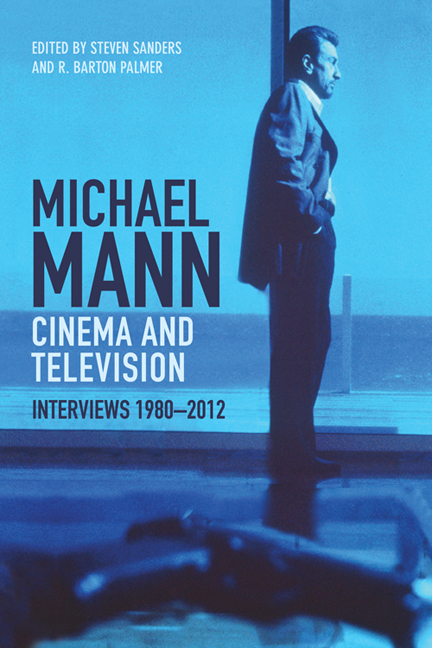Book contents
- Frontmatter
- Contents
- List of Illustrations
- Acknowledgements
- Introduction: Michael Mann in His Interviews
- 1 Four Minute Mile
- 2 Castle Keep
- 3 Of Vice and Mann
- 4 Manhunter: An Interview with Michael Mann
- 5 Michael Mann: Hollywood Writer–Director–Producer
- 6 Mann and His Movies
- 7 All the Corporations’ Men
- 8 Smoking Gun
- 9 “Ali Likes the Film a Lot. He's Seen it Six Times”
- 10 Paint it Black
- 11 Mann Among Men
- 12 L.A. Belongs to the Coyotes
- 13 Michael Mann Interview
- 14 A Mann's Man's World
- 15 Number One with a Bullet
- 16 The Study of Mann
- Chronology
- Filmography
- Publisher's Acknowledgments
- Index
Introduction: Michael Mann in His Interviews
Published online by Cambridge University Press: 05 September 2016
- Frontmatter
- Contents
- List of Illustrations
- Acknowledgements
- Introduction: Michael Mann in His Interviews
- 1 Four Minute Mile
- 2 Castle Keep
- 3 Of Vice and Mann
- 4 Manhunter: An Interview with Michael Mann
- 5 Michael Mann: Hollywood Writer–Director–Producer
- 6 Mann and His Movies
- 7 All the Corporations’ Men
- 8 Smoking Gun
- 9 “Ali Likes the Film a Lot. He's Seen it Six Times”
- 10 Paint it Black
- 11 Mann Among Men
- 12 L.A. Belongs to the Coyotes
- 13 Michael Mann Interview
- 14 A Mann's Man's World
- 15 Number One with a Bullet
- 16 The Study of Mann
- Chronology
- Filmography
- Publisher's Acknowledgments
- Index
Summary
In 1995, Graham Fuller wrote that “Mann alone, among American auteurs, has spanned both mediums [feature films and television] and maintained a consistent, urgent voice.” Michael Mann Cinema and Television: Interviews 1980–2012 collects for the first time Mann's discussions of the work in film and television that has earned him critical acclaim and a worldwide following. Spanning the entire career to date of the award-winning screenwriter–director– producer, the volume brings together sixteen incisive interviews by an international roster of critics, commentators, journalists, and film and television insiders, making it the definitive collection of Mann's own assessment of his cinema and television career.
The interviews elicit some of his most revealing comments on his work ethic, methods, and style. He describes some of the things in his work in film and television of which he is most proud. He explains why Stanley Kubrick's Dr. Strangelove (1964) had such a profound effect on him. And he rebuts the criticism that his films are burdened by excessive style. Throughout, Mann discusses themes such as crime, locale, and developing technologies in cinema. In some of the interviews Mann comments on his seemingly existentialist ideas. Others focus on his stylistics of evil and horror, and his depiction of the corporatization of crime. Still others discuss his creation of a new noir that brings together the themes of professionalism, crime, vice, and redemption in the megalopolises of Los Angeles and Miami, and the evolution of a wholly new model of criminal trafficking on a global scale.
The interviews are arranged chronologically from 1980 to 2012, and encompass Mann's work from his Emmy Award-winning telefilm The Jericho Mile (1979) to his most recent directorial venture, the pilot episode of the HBO series Luck (2011–12). The interviews originally appeared in publications in the United States, Great Britain, France, and Germany, and typically focus on discussions of one or more of Mann's ten feature films: Thief (1981), The Keep (1983), Manhunter (1986), The Last of the Mohicans (1992), Heat (1995), The Insider (1999), Ali (2001), Collateral (2004), Miami Vice (2006), and Public Enemies (2009). A few of the selections are more broadly conceived as profile pieces and many touch on the television series Miami Vice (1984–9).
- Type
- Chapter
- Information
- Michael Mann - Cinema and TelevisionInterviews, 1980-2012, pp. 1 - 14Publisher: Edinburgh University PressPrint publication year: 2014

